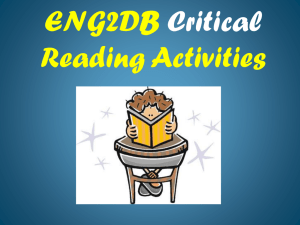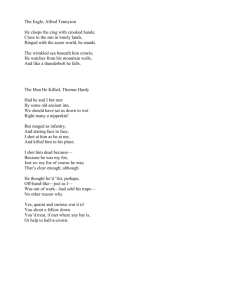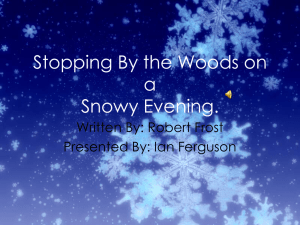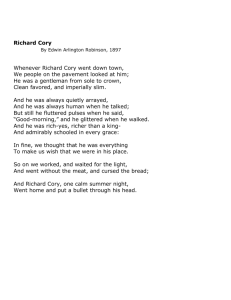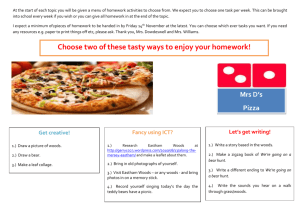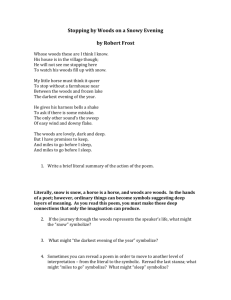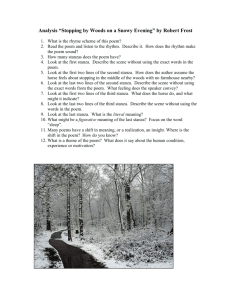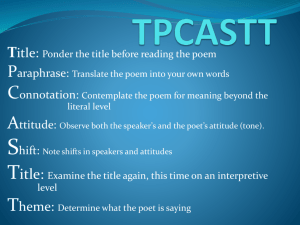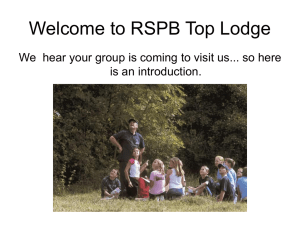Poetry Analysis: Birney & Frost - Nature & Mood
advertisement
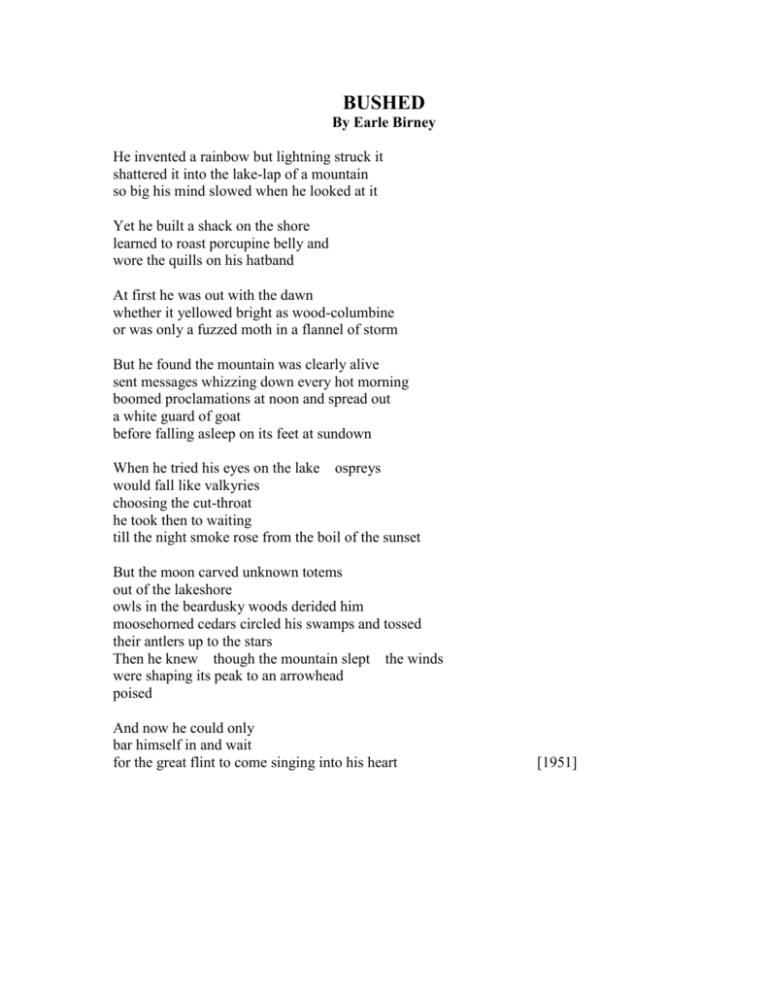
BUSHED By Earle Birney He invented a rainbow but lightning struck it shattered it into the lake-lap of a mountain so big his mind slowed when he looked at it Yet he built a shack on the shore learned to roast porcupine belly and wore the quills on his hatband At first he was out with the dawn whether it yellowed bright as wood-columbine or was only a fuzzed moth in a flannel of storm But he found the mountain was clearly alive sent messages whizzing down every hot morning boomed proclamations at noon and spread out a white guard of goat before falling asleep on its feet at sundown When he tried his eyes on the lake ospreys would fall like valkyries choosing the cut-throat he took then to waiting till the night smoke rose from the boil of the sunset But the moon carved unknown totems out of the lakeshore owls in the beardusky woods derided him moosehorned cedars circled his swamps and tossed their antlers up to the stars Then he knew though the mountain slept the winds were shaping its peak to an arrowhead poised And now he could only bar himself in and wait for the great flint to come singing into his heart [1951] “Bushed” 1) What lines indicate that the speaker became adept at living in the wild? ________________________________________________________________________ ________________________________________________________________________ ________________________________________________________________________ 2) What has occurred to the speaker throughout his time in the wilderness? ________________________________________________________________________ ________________________________________________________________________ ________________________________________________________________________ 3) Identify a metaphor and personification that has been used in the poem. What effect is created through the use of these literary devices? ________________________________________________________________________ ________________________________________________________________________ ________________________________________________________________________ 4) There are areas within the poem that have spaces. What are the spaces meant to communicate to the reader? ________________________________________________________________________ ________________________________________________________________________ ________________________________________________________________________ 5) The diction, or choice of words, that Earle Birney has chosen communicates the narrator’s paranoia. Find four examples of words that communicate this state of mind. ________________________________________________________________________ ________________________________________________________________________ ________________________________________________________________________ 6) How would you cope alone in the wilderness for a lengthy amount of time? ________________________________________________________________________ ________________________________________________________________________ ________________________________________________________________________ Stopping by Woods on a Snowy Evening By Robert Frost Whose woods these are I think I know, His house is in the village though. He will not see me stopping here, To watch his woods fill up with snow. My little horse must think it queer, To stop without a farmhouse near, Between the woods and frozen lake, The darkest evening of the year. He gives his harness bells a shake, To ask if there is some mistake. The only other sound's the sweep, Of easy wind and downy flake. The woods are lovely, dark and deep, But I have promises to keep, And miles to go before I sleep, And miles to go before I sleep. “Stopping by Woods on a Snowy Evening” 1) Identify the rhyme scheme of the first stanza. ________________________________________________________________________ ________________________________________________________________________ 2) Identify the rhyme scheme of the last stanza. ________________________________________________________________________ ________________________________________________________________________ 3) What line do you think is the most significant in the last stanza? Why? ________________________________________________________________________ ________________________________________________________________________ ________________________________________________________________________ 4) What do you think the meaning is of the line identified in number three? ________________________________________________________________________ ________________________________________________________________________ ________________________________________________________________________ 5) What is the mood of the poem? What creates the mood? ________________________________________________________________________ ________________________________________________________________________ ________________________________________________________________________ Written Response In a well-formulated response, contrast these two poems with regards to their ideas concerning nature. And Explain how the form, diction, and/or figurative language in each poem creates different moods. ________________________________________________________________________ ________________________________________________________________________ ________________________________________________________________________ ________________________________________________________________________ ________________________________________________________________________ ________________________________________________________________________ ________________________________________________________________________ ________________________________________________________________________ ________________________________________________________________________ ________________________________________________________________________ ________________________________________________________________________ ________________________________________________________________________ ________________________________________________________________________ ________________________________________________________________________ ________________________________________________________________________ ________________________________________________________________________ ________________________________________________________________________ ________________________________________________________________________ ________________________________________________________________________ ________________________________________________________________________ ________________________________________________________________________ ________________________________________________________________________ ________________________________________________________________________ ________________________________________________________________________
